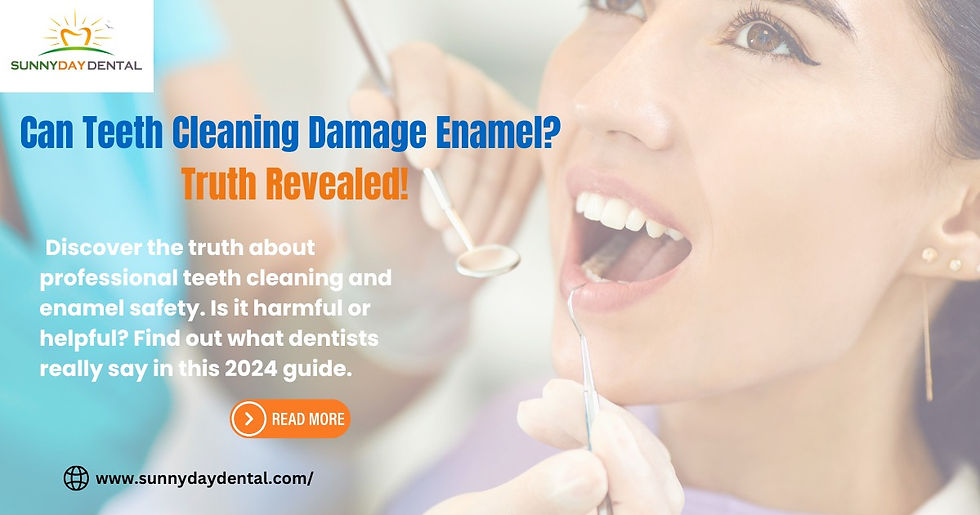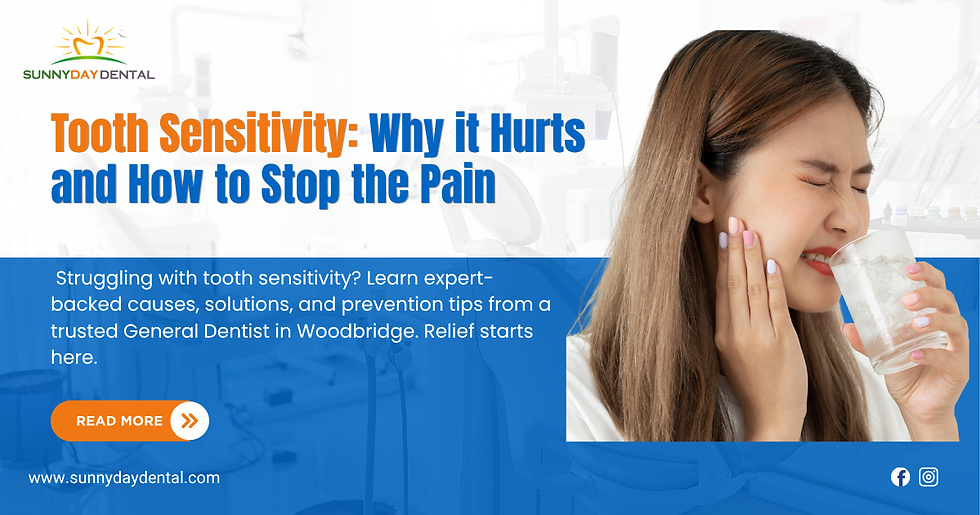Can Teeth Cleaning Damage Enamel? [Truth Revealed!]
- Sunny Day Dental
- Apr 1
- 4 min read

As an experienced dentist, I get this question all the time: "Can teeth cleaning damage enamel?" It's a valid concern. After all, enamel is the hardest substance in the human body, and it's irreplaceable. But what if you're unknowingly putting it at risk every time you go for a cleaning?
Let’s break it down and find out the facts, backed by the latest dental research and expert consensus in 2024.
Understanding Enamel: Your Tooth’s First Line of Defense
To answer whether teeth cleaning damages enamel, we need to understand what enamel is. Enamel is the protective outer layer of your teeth. It shields against bacteria, acid, and plaque. But once enamel is eroded, it doesn’t regenerate. That’s why many patients worry about anything that might harm it.
What Happens During Professional Teeth Cleaning?
Professional teeth cleaning, also known as prophylaxis, typically involves:
Scaling: Removing plaque and tartar buildup
Polishing: Smoothing and cleaning the tooth surface
Fluoride Treatment (optional): Strengthening enamel post-cleaning
At first glance, scraping and polishing might sound abrasive. But in skilled hands and with modern equipment, professional teeth cleaning is safe and beneficial.
So, Can Teeth Cleaning Damage Enamel?
The short answer:
No, professional teeth cleaning does not damage enamel.
Here's why:
Plaque and tartar cause more harm: If left untreated, they erode enamel and lead to gum disease. Regular cleaning removes these threats.
Modern tools are enamel-safe: Ultrasonic scalers and fine polishing pastes are designed to clean teeth thoroughly without harming enamel
Frequency matters: According to the American Dental Association (ADA), biannual cleanings are ideal. Excessive cleanings (more than 4-6 times a year) might irritate enamel only if improperly performed.
Trained professionals know the pressure: Dental hygienists and dentists are trained to apply the right technique that maintains enamel integrity.
So if you've been worried about teeth cleaning damage enamel, rest assured: when done correctly, it's actually protecting your enamel, not harming it.
Debunking Common Myths About Teeth Cleaning
Myth 1: Scaling scratches your teeth.
Fact: It only removes plaque and tartar. The smooth feeling post-cleaning isn’t from enamel loss; it’s from clean, polished teeth.
Myth 2: Frequent cleanings thin enamel.
Fact: Studies show no correlation between routine cleanings and enamel thinning. In fact, skipping cleanings increases enamel erosion due to unchecked bacteria
Myth 3: Sensitive teeth mean your enamel is gone after cleaning.
Fact: Temporary sensitivity is normal and usually caused by exposed dentin, not enamel loss.
Teeth Cleaning Techniques That Preserve Enamel
If you’re still worried about teeth cleaning damage enamel, here’s what a responsible dental practice does:
Uses ultrasonic scalers to break tartar with minimal friction
Applies fine-grit polishing pastes safe for enamel
Offers fluoride varnish post-cleaning for added protection
Recommends cleaning frequency based on individual needs (not one-size-fits-all)
How to Protect Enamel Between Cleanings
Keeping enamel strong is a daily commitment. Here’s how you can support it:
Brush with fluoride toothpaste twice a day
Use a soft-bristled brush and gentle strokes
Avoid overbrushing or using whitening pastes daily
Limit acidic drinks like soda and citrus juices
Rinse after meals to balance pH levels
Remember, even the best teeth cleanings in Woodbridge can only do so much if home care isn’t consistent.
Can Teeth Cleaning Damage Enamel?
No, professional teeth cleaning does not damage enamel. Modern dental tools and trained professionals ensure the procedure removes plaque safely without harming your tooth's protective layer. In fact, regular cleanings help preserve enamel by removing the bacteria and acids that would otherwise erode it.
Why Choose Professional Teeth Cleanings in Woodbridge?
Teeth cleanings in Woodbridge, especially at reputable clinics like Sunny Day Dental, use advanced tools and personalized techniques. The focus isn’t just on aesthetics – it’s about preventive care, enamel protection, and overall dental wellness.
Patients often report their teeth feel cleaner, stronger, and healthier after a session – not weaker. That’s because we don’t just clean; we educate, protect, and treat your smile like it’s our own.
Don’t Skip Your Cleanings Over Myths
The concern about teeth cleaning damage enamel usually stems from misinformation or past bad experiences. But when done correctly, dental cleanings are essential to enamel protection and overall oral health.
So the next time your cleaning appointment comes up, keep it. It’s one of the smartest steps you can take to maintain a healthy, confident smile.
Book a Safe, Gentle Teeth Cleaning in Woodbridge Today
At Sunny Day Dental, we know how valuable your enamel is. That’s why our professional cleanings are designed with care, precision, and your comfort in mind. Whether you need your first cleaning or it’s time for your biannual visit, we’re here to make it a stress-free, beneficial experience.
FAQs: Can Teeth Cleaning Damage Enamel?
1. How often should I get my teeth professionally cleaned?
Most people benefit from cleanings every 6 months. However, if you have gum disease or plaque-prone teeth, your dentist may recommend more frequent cleanings tailored to your oral health.
2. Is enamel loss permanent?
Yes, enamel does not grow back. That’s why prevention through cleanings, fluoride, and good brushing habits is essential. Early care can stop erosion before it worsens.
3. Why do my teeth feel sensitive after a cleaning?
Temporary sensitivity can occur due to exposed dentin or gum recession. It usually subsides within a few days. Using a desensitizing toothpaste can help ease discomfort.
4. Can I opt out of polishing if I have sensitive teeth?
Absolutely. Dental cleanings can be customized. Talk to your dentist beforehand. In some cases, a polish-free cleaning or using a less abrasive paste can reduce sensitivity.
5. What’s the safest way to clean teeth at home without harming enamel?
Use a soft-bristled toothbrush, brush for two minutes twice daily, and avoid harsh scrubbing. Fluoride toothpaste and flossing are key. Avoid DIY whitening or aggressive scrapers at home.




Comments